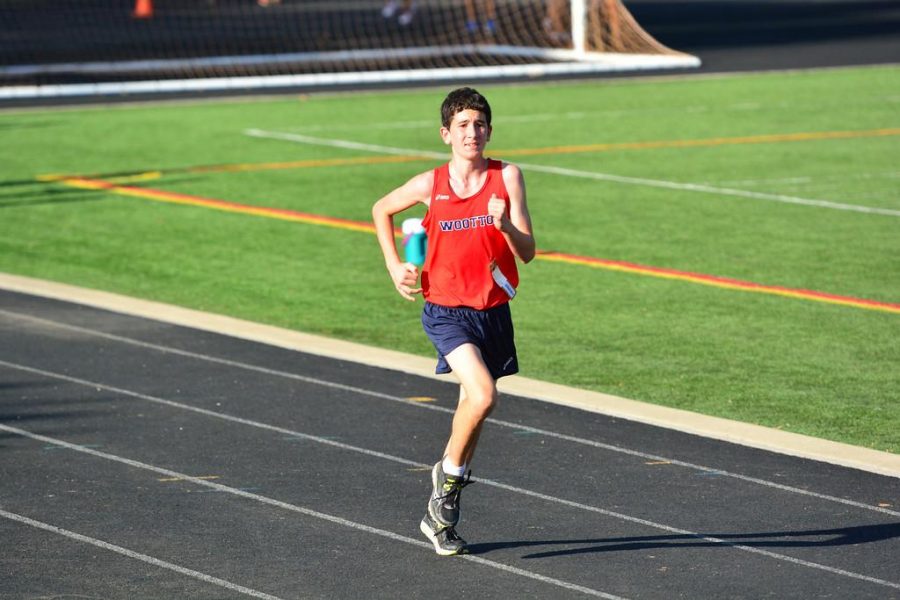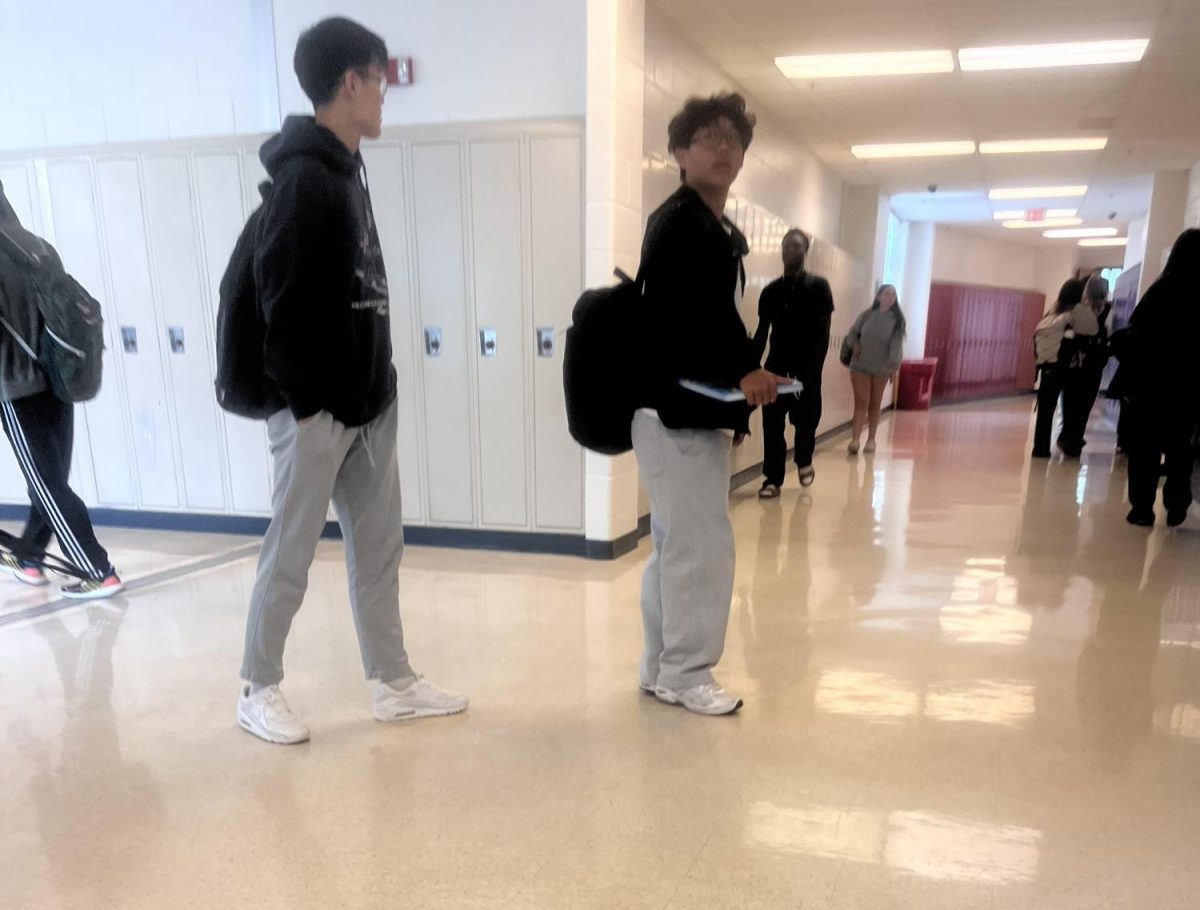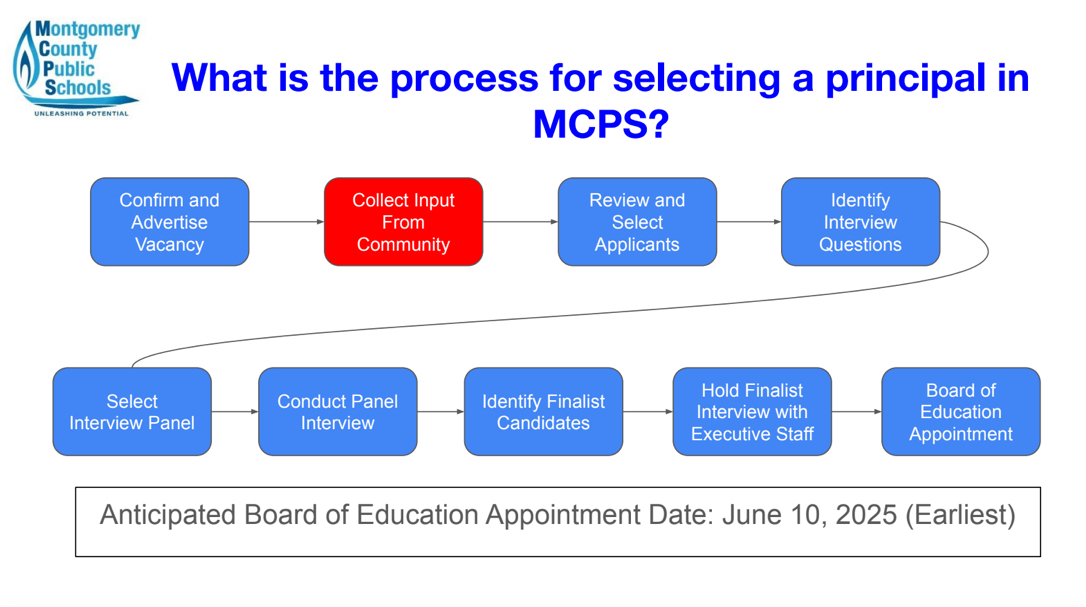Student’s day left Starr exhausted, inspired- Evva Starr, Newspaper Adviser
When I spent the day following senior Matthew Klein through his schedule, I expected to feel exhausted, overwhelmed and at the end, more understanding of what students go through each day. Here’s what I expected and what really happened.
Expectation: To be overwhelmed by the demands of seven different courses.
Reality: I WAS overwhelmed, but I was also fascinated by the material in every single class, and I loved having the opportunity to have an expert in these various fields tell me stuff I didn’t know (or learned long ago and forgot). Matt Winter’s AP Comparative Government course involved a lecture on Nigeria. All I know about Nigeria is that their predominant language is Igbo and their most famous author is Chinua Achebe (Things Fall Apart). Neither of those was on the quiz and I was disappointed to get a 4/10. But the lecture was fascinating, Winter is a force of energy and I learned a lot. Did you know that Nigeria had a civil war from 1967-1970 and the part that tried to secede was named Biafra? I didn’t – and am embarrassed about it.
Amy Pollin’s seventh period AP European History course involved a lecture about World War II. I took this class junior year of high school (full disclosure: I got a two on the exam) and hated it but Pollin made the material fascinating. Did you know Hitler’s army was using amphetamines to stay awake for days at a time and Hitler himself was on a cocktail of uppers and downers that make historians question many of his decisions? How did I not know this? When the bell rang I didn’t want to leave.
Expectation: To find the social dynamics of the day confusing and stressful.
Reality: I didn’t see Matt experiencing this at all. Maybe that’s because he’s a second semester senior and more sure of himself and his place than a younger student might be. The one interaction that was interesting was the one time of the day he sees his girlfriend, senior Emma Henderson. I asked what they plan to do next year, when they are both off to college. Both said they are purposely not discussing it until they have to. This took me right back to the summer of 1990, on a front step in Silver Spring, when my boyfriend and I discussed what we were going to do, a subject we had also avoided for months. That conversation was one of the hardest of my life – and I don’t envy Matt and Emma. (Full disclosure: The boyfriend and I decided to see other people when apart but be together when home, and I guess it worked because we’ve been married for 18 years.)
Expectation: To be bored
Reality: Educational research says a student’s day is filled with time-wasters like attendance-taking, classroom discipline and teachers using time poorly. I did not find this to be the case at all. Matt’s day was filled with teachers who were passionate, material that was engaging in rooms full of engaged students, and interactions that were based on respect. I know as a teacher how much work his teachers have put in to make classroom environments that flow so smoothly. In Malinda Pierce’s second period ceramics I was amazed when, without one word from Pierce, everyone got up, did their cleaning jobs and peacefully exited. In Eugenia’s Chiu’s third period AP Statistics, students scored each other’s quizzes earnestly. All day long I was impressed by my colleagues, master teachers who deserve the respect their students show them.
Expectation: To find the parking lot the most miserable part of the day.Reality: After 10 years of hearing seniors complain about how long it takes to get in and out of the lower lot, and how frustrating all the other drivers are, I was looking forward to entering and exiting the lot with Matt and experiencing his pain. Truth: you are all whiny complainers. Have you never been to a sporting event or concert? Getting a lot of cars out of one large lot takes a while. But, we parked in the morning with no problem and the 2:30 exit took about eight minutes. If this is the worst part of your day, you all live pretty great lives. The worst part of the day ended up being carrying Matt’s backpack. He insists on wearing the straps all the way loose (Multiple students told me tight straps are super-loser) so I had to lean forward to keep from tipping backward. My shoulders hurt in the evening. The barrage of papers I was given all day long seemed like grains of sand that add up to a desert.
At the end of the day, I felt exhausted, but I feel that as a teacher too. I also felt inspired by my colleagues, both sad and thrilled about the endings (and beginnings) I know are coming for Matt, appreciative of the challenges he faces each day, and ultimately thankful that tomorrow, I get to go back to being a teacher.
Teacher’s day exhausting, eye-opening- Matthew Klein, Managing Editor
I fully anticipated a stress-free day when I decided to shadow Evva Starr, an English teacher and my newspaper adviser, on April 4. Teachers, after all, spend three of eight class periods off from teaching, and most have departed by 3 p.m.. It certainly wouldn’t compare to what is required of me, the student.
The experience, however, was both exhausting and eye-opening. Aside from the mound of bureaucratic work required, I was dizzied by the franticness involved with student absences and planning lessons for three different classes over five periods. Similarly, I was awed by the conflicting challenges of presenting instruction while maintaining classroom order. I came to the conclusion that there is a great deal that students misunderstand about the busyness of the teacher experience.
We began our morning at the staff parking lot at promptly 7:15 a.m., the time by which teachers must be at school each day. Almost immediately after arriving in room 242, where Starr spends the time before school begins, we began checking a barrage of emails. For about 25 minutes we sifted through and responded to them, many of which were sent by students who were absent and needed to make up work. By the time 7:40 came, we still had not responded to all of them, but I assumed that during Starr’s first off-period of the day (1st period) we would have plenty of time to do that and more.
Perhaps because the name is so misleading (“off” makes it sound like a break from work), I was shocked by how stressful it was. As she finished responding to student-written emails, I watched as she entered a website designed for scheduling substitute teachers—one of an innumerable number of databases the county provides for assorted teacher functions that act to make things easier but rarely have that effect. After she completed the online portion of the request and received the requisite confirmation email, I was shocked to learn that there was yet another form that needed to be filled out for the same purpose of hiring a substitute, but by hand.
It was at this point in the morning—at the beginning of second period, Starr’s only other “off-period” of the day besides lunch—that we decided to move from the Writing Center to the English department office, where we shared tea and a brief snack.
As we returned to the Writing Center for the second consecutive off-period after a lengthy trip to the main office, Starr began planning the lessons for each of her five classes covering three different subjects (AP Literature, Honors English 12, and newspaper).
I got the opportunity to help Starr plan the lesson for her AP Literature students, who were discussing a series of chapters on their assigned text, Jane Eyre. We discussed and debated the numerous ways she could teach the reading material, much of which revolved around group-oriented work. We ultimately decided on presentations for small groups of three or four. We did the math in our heads—10 minutes to allow the groups to create their presentations and three minutes each for the groups of three to present totaled 37 minutes of class. Plus, Starr wanted to go over a sample essay for scores they would be getting back that day. I had never considered how challenging it was to confine a lesson to such a precise time period.
After Starr posted the plans and attachments on Google Classroom, it was time to head off to her first class, newspaper, during third period. Newspaper is heavily student-led, so Starr had the opportunity to continue to check up on work following brief announcements to the class. This gave her extra time to adapt an Honors English 12 worksheet from coworker Kearney Blandamer.
When we went to AP Literature, I was impressed by Starr’s incredible knowledge of her students’ behavioral patterns (she gave me several students she thought would show up late or would be particularly loud upon entering, for example). Similarly noteworthy was the effort she put into simply choosing a place to stand as students were speaking. As a student spoke, she often moved to the opposite side of the room in order to get them to speak up. Just by moving closer to students who were talking she was able to get them to stop. And she remained unbelievably attentive to what the students were saying all the while, never cutting them off and always adding onto their thoughts at the end.
As the day went on, things seemed to slow down from the morning craziness. A few things I observed were that Starr was more concise in her eighth period literature class since she had “worked out some kinks” from her earlier class, that her last class of the day had particularly loud students and that the larger the class size was, the more challenging it truly was for students to pay attention and get selective attention.
Much occurred when I followed Starr around for a day, but from it all I learned one truly valuable lesson—teachers have much more work than I ever thought, especially considering that no grading was done the day I followed her, and she can handle it—must handle it—with a calmness and patience students rarely possess.








